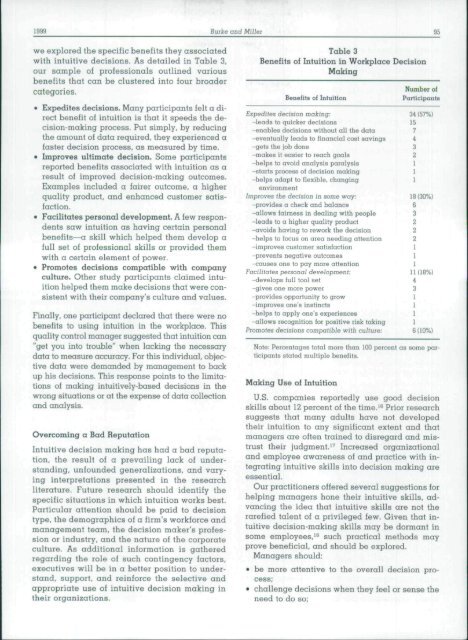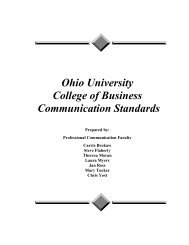Taking the mystery out of intuitive decision making
Taking the mystery out of intuitive decision making
Taking the mystery out of intuitive decision making
You also want an ePaper? Increase the reach of your titles
YUMPU automatically turns print PDFs into web optimized ePapers that Google loves.
1999 Burke and Millei 95<br />
we explored <strong>the</strong> specific benefits <strong>the</strong>y associated<br />
with <strong>intuitive</strong> <strong>decision</strong>s. As detailed in Table 3,<br />
our sample <strong>of</strong> pr<strong>of</strong>essionals <strong>out</strong>lined various<br />
benefits that can be clustered into four broader<br />
categories.<br />
• Expedites <strong>decision</strong>s. Many participants felt a direct<br />
benefit <strong>of</strong> intuition is that it speeds <strong>the</strong> <strong>decision</strong>-<strong>making</strong><br />
process. Put simply, by reducing<br />
<strong>the</strong> amount <strong>of</strong> data required, <strong>the</strong>y experienced a<br />
faster <strong>decision</strong> process, as measured by time.<br />
• Improves ultimate <strong>decision</strong>. Some participants<br />
reported benefits associated with intuition as a<br />
result <strong>of</strong> improved <strong>decision</strong>-<strong>making</strong> <strong>out</strong>comes.<br />
Examples included a fairer <strong>out</strong>come, a higher<br />
quality product, and enhanced customer satisfaction.<br />
• Facilitates personal development. A few respondents<br />
saw intuition as having certain personal<br />
benefits—a skill which helped <strong>the</strong>m develop a<br />
full set <strong>of</strong> pr<strong>of</strong>essional skills or provided <strong>the</strong>m<br />
with a certain element <strong>of</strong> power.<br />
• Promotes <strong>decision</strong>s compatible with company<br />
culture. O<strong>the</strong>r study participants claimed intuition<br />
helped <strong>the</strong>m make <strong>decision</strong>s that were consistent<br />
with <strong>the</strong>ir company's culture and values.<br />
Finally, one participant declared that <strong>the</strong>re were no<br />
benefits to using intuition in <strong>the</strong> workplace. This<br />
quality control manager suggested that intuition can<br />
"get you into trouble" when lacking <strong>the</strong> necessary<br />
data to measure accuracy. For this individual, objective<br />
data were demanded by management to back<br />
up his <strong>decision</strong>s. This response points to <strong>the</strong> limitations<br />
<strong>of</strong> <strong>making</strong> <strong>intuitive</strong>ly-based <strong>decision</strong>s in <strong>the</strong><br />
wrong situations or at <strong>the</strong> expense <strong>of</strong> data collection<br />
and analysis.<br />
Overcoming a Bad Reputation<br />
Intuitive <strong>decision</strong> <strong>making</strong> has had a bad reputation,<br />
<strong>the</strong> result <strong>of</strong> a prevailing lack <strong>of</strong> understanding,<br />
unfounded generalizations, and varying<br />
interpretations presented in <strong>the</strong> research<br />
literature. Future research should identify <strong>the</strong><br />
specific situations in which intuition works best.<br />
Particular attention should be paid to <strong>decision</strong><br />
type, <strong>the</strong> demographics <strong>of</strong> a firm's workforce and<br />
management team, <strong>the</strong> <strong>decision</strong> maker's pr<strong>of</strong>ession<br />
or industry, and <strong>the</strong> nature <strong>of</strong> <strong>the</strong> corporate<br />
culture. As additional information is ga<strong>the</strong>red<br />
regarding <strong>the</strong> role <strong>of</strong> such contingency factors,<br />
executives will be in a better position to understand,<br />
support, and reinforce <strong>the</strong> selective and<br />
appropriate use <strong>of</strong> <strong>intuitive</strong> <strong>decision</strong> <strong>making</strong> in<br />
<strong>the</strong>ir organizations.<br />
Table 3<br />
Benefits <strong>of</strong> Intuition in Workplace Decision<br />
Making<br />
Benefits <strong>of</strong> Intuition<br />
Expedites <strong>decision</strong> mating.-<br />
-leads to quicker <strong>decision</strong>s<br />
-enables <strong>decision</strong>s with<strong>out</strong> all <strong>the</strong> data<br />
-eventually leads to financial cost savings<br />
-gets <strong>the</strong> job done<br />
-makes it easier to reach goals<br />
-helps to avoid analysis paralysis<br />
-starts process <strong>of</strong> <strong>decision</strong> <strong>making</strong><br />
-helps adapt to flexible, changing<br />
environment<br />
Improves <strong>the</strong> <strong>decision</strong> in some way:<br />
-provides a check and balance<br />
-allows fairness in dealing with people<br />
-leads to a higher quality product<br />
-avoids baving to rework <strong>the</strong> <strong>decision</strong><br />
-helps to focus on area needing attention<br />
-improves customer satisfaction<br />
-prevents negative <strong>out</strong>comes<br />
-causes one to pay more attention<br />
Facilitates personal development:<br />
-develops iull tool set<br />
-gives one more power<br />
-provides opportunity to grow<br />
-improves one's instincts<br />
-helps to apply one's experiences<br />
-allows recognition for positive risk taking<br />
Promotes <strong>decision</strong>s compatible with culture:<br />
Number <strong>of</strong><br />
Participants<br />
34 (57%)<br />
15<br />
7<br />
4<br />
3<br />
2<br />
1<br />
1<br />
1<br />
18 m%)<br />
6<br />
3<br />
a 2<br />
2<br />
1<br />
1<br />
1<br />
11(18%)<br />
4<br />
3<br />
I<br />
1<br />
1<br />
1<br />
6(10%)<br />
Note: Percentages total more than 100 percent as some participants<br />
stated multiple benefits.<br />
Making Use <strong>of</strong> Intuition<br />
U.S. companies reportedly use good <strong>decision</strong><br />
skills ab<strong>out</strong> 12 percent <strong>of</strong> <strong>the</strong> time."* Prior research<br />
suggests that many adults have not developed<br />
<strong>the</strong>ir intuition to any significant extent and that<br />
managers are <strong>of</strong>ten trained to disregard and mistrust<br />
<strong>the</strong>ir judgment.''' Increased organizational<br />
and employee awareness <strong>of</strong> and practice with integrating<br />
<strong>intuitive</strong> skills into <strong>decision</strong> <strong>making</strong> are<br />
essential.<br />
Our practitioners <strong>of</strong>fered several suggestions for<br />
helping managers hone <strong>the</strong>ir <strong>intuitive</strong> skills, advancing<br />
<strong>the</strong> idea that <strong>intuitive</strong> skills are not <strong>the</strong><br />
rarefied talent <strong>of</strong> a privileged few. Given that <strong>intuitive</strong><br />
<strong>decision</strong>-<strong>making</strong> skills may be dormant in<br />
some employees,'^ such practical methods may<br />
prove beneficial, and should be explored.<br />
Managers should:<br />
• be more attentive to <strong>the</strong> overall <strong>decision</strong> process;<br />
• challenge <strong>decision</strong>s when <strong>the</strong>y feel or sense <strong>the</strong><br />
need to do so;




